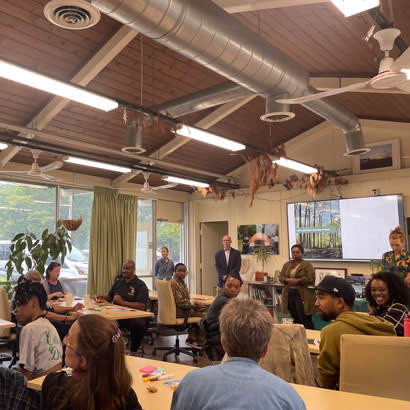
Pictured: A community meeting at Detroit Exploration & Nature Center, located in Palmer Park in Detroit, Michigan.
Green spaces that feel safe can offer healing and feel like sanctuaries to the people who use them. Through NRPA’s Resilient Park Access grant program, Detroit Parks and Recreation was given the opportunity to create seven nature pockets that are centered in equity and social and climate resiliency. These nature pockets are to be a reflection and extension of the communities they are in and represent the residents by telling the stories that are most important to them.
Detroit Parks and Recreation’s mission is to uplift the requests of community members and leaders to ensure these areas reflect the community’s needs. Furthermore, these nature pockets will be an impactful intersection of celebrating the environment and embodying the essence of what makes that community who they are.
One way this is being done is by engaging the community through various platforms. Community leaders have been involved in this process from the beginning via a community advisory council. The advisory council has helped inform ideas that have been implemented during this project, including creating an expansive definition of nature that is rooted in not just place, but also in people. This definition has been impactful to share in the community meetings so that residents can feel and see how they will be represented in these spaces.
In creating these nature pockets, Detroit Parks and Recreation has been working across departments from the beginning. Particularly, they’ve been working closely with the landscape and design unit and the general services department — more specifically, the landscape architects and the deputy chief parks planner — who have an abundance of knowledge on the specifications of the parks and the stewardship groups associated with them. The Greening of Detroit, a local nonprofit, also has been a crucial partner in this work. Its mission — geared towards planting trees and educating the community on their importance — provides a wealth of knowledge within both the programming and parks perspective. By these organizations coming together, the Detroit Parks and Recreation team has been able to have the necessary conversations about how parks could benefit from these nature pockets and who would be invested in the process to get the project completed.
While Detroit Parks and Recreation has been working diligently with other departments and local nonprofits, one of the current challenges is having transparent conversations about capacity. This includes setting expectations about who is responsible for maintaining the nature pockets. The Detroit team realized that the management of these nature pockets is going to be something that the grounds crews within the general services department and community stewardship groups are going to have to work together on and are currently working to figure out the best way to go about this.
“We realize that challenges like these are all a part of the process and necessary conversations to have when doing work that is based in equity,” says Rachel Felder, a naturalist for Detroit Parks and Recreation.
When NRPA staff visited Detroit in June 2023, they witnessed Detroit Parks and Recreation staff working alongside partnering community-based organizations and residents to receive input on the installation of pocket parks and Detroit’s nature equity plan. During the visit, NRPA was able to:
- Facilitate a discussion with Detroit Parks Coalition members to discuss what nature equity means to the people of Detroit
- Convene Detroit’s planning and maintenance professionals on maintenance and stewardship of the pocket parks
- Sit in on Detroit’s community meeting where residents got the opportunity to give their input on the pocket parks and where they should be located
- Toured green spaces in Detroit owned by community partners Sanctuary Farms and Rescue MI Nature Now to see various ways green spaces are utilized throughout the city
Detroit Parks and Recreation’s community engagement efforts in this work exemplify how to bring the community along throughout each step of the process so they can see themselves in the work. In the community meeting the parks and recreation department held, residents passionately discussed the different ways they felt connected to nature in their communities. Residents also had the opportunity to choose areas where these pocket parks would be most impactful. Detroit Parks and Recreation’s willingness to engage its community during the planning stages of this project showed its commitment to serving the community’s needs through this project.
To find synergy in this work among both the City of Detroit’s programmers and maintenance teams, NRPA facilitated a workshop to help identify long-term maintenance and operation plans for their project. What transpired from this was that both departments were able to come together to collectively identify what policies and practices could be utilized, pivoted, changed or improved to help Detroit’s nature equity and nature pocket park work. This workshop was a great example of how Detroit Parks and Recreation is working across departments to help ensure the long-term success of their project.
The installation of these pocket parks throughout the city of Detroit will certainly help invite the community into nature in spaces where nature and wildlife may not exist otherwise. Even when community members indicated how a nature equity plan may not be some residents’ most pressing issue, the Detroit Parks and Recreation team asked community members how nature is important to them. This question alone helped community members not only see themselves in Detroit’s work, but as part of the planning process. This community-centered approach was evident in all of Detroit Parks and Recreation’s efforts and will continue to be an important factor in ensuring the success of the pocket parks, as well as realizing the vision of the city’s nature equity plan.
Justin Taylor (he/him) is a program specialist at NRPA.
Rachel Felder (she/her) is a naturalist at Detroit Parks and Recreation.

